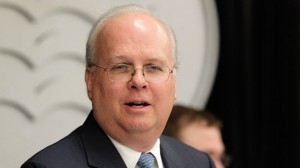Karl Roves’ Crossroads GPS, the U.S. Chamber of Commerce and a number of other politically active nonprofit organizations got some bad news last week. They may have to start disclosing who has been giving them millions of dollars to influence the outcome of the 2012 election.
In a 2-to-1 decision on May 14, a U.S. Court of Appeals panel in D.C. refused to stay an earlier ruling by a federal judge. The decision makes disclosure of donors an immediate requirement for tax-exempt organizations that produce election-related ads that appear on television. The decision is being hailed as a significant victory for those who have been fighting to push back against the rising tide of “dark money” that has flooded the American presidential and congressional campaigns.
Unlike super PACs which are required to disclose their donors to the FEC on a quarterly basis, tax-exempt nonprofits involved in the creation of “issue ads” didn’t have to say where the money funding the ads came from. These nonprofits, classified by the IRS as “social welfare” organizations, spent over $80 million dollars in the 2010 congressional races. In most cases, they didn’t disclose their donors.
According to Paul Blumenthal at The Huffington Post, “Advertisements falling under the rubric of ‘electioneering communications’ include those run against President Barack Obama by the American Energy Alliance and Americans for Prosperity, both nonprofits linked to the Koch brothers. … Crossroads GPS, a non-profit linked to Karl Rove, has run millions of electioneering communications against Obama and Democratic senators this election cycle without disclosing any of their donors.”
Rep. Chris Van Hollen (D-Md.) challenged these FEC rules in 2011, arguing that the rules preventing disclosure were an unlawful interpretation of the plain language of the McCain-Feingold campaign finance reform law, which mandated disclosure of these donors. Therefore, he said, they should be tossed out by the court.
Those fighting disclosure say that the ruling will have a chilling effect on political participation, and experts say that although the Supreme Court is typically a proponent of disclosure laws surrounding political speech, it may be sympathetic in this case if those who oppose disclosure can successfully argue that donors fearing harrassment would stop funding ads if they were forced to disclose. No word yet on whether the Supreme Court will hear the case.
Fred Wertheimer, president of Democracy 21 and a lawyer who joined Van Hollen’s case, says that although he considers the decision a “very important breakthrough victory, we have more work ahead of us.” He pointed out that a similar loophole exists for what are called independent expenditure, or express advocacy ads — commercials in which voting for or against a candidate is encouraged — and “we have no idea how many groups may switch in order to continue avoiding the disclosure.”
Legal blogger Rick Hasen wrote in Slate that some groups have already started: “No one really expected these outside groups to run independent expenditure ads, because doing so could raise questions about whether the groups are violating IRS and FEC rules requiring such groups to register as a political committee. But sure enough, electioneering communications from these groups have dried up, replaced by independent expenditures. …”
“[D]on’t expect to see Karl Rove’s Rolodex just yet. Crossroads GPS and other groups have found that raising money from donors who don’t want to be disclosed is good for business, and they’ve got a few ways to keep the unlimited money poured into campaigns secret yet.”
Wertheimer says he is looking at a second lawsuit to challenge the express advocacy ad loophole, but has not yet done so. He says he believes that in the longterm “we need to pass the DISCLOSE Act.” The bill, co-sponsored by Senators Patrick Leahy, Chuck Schumer and Sheldon Whitehouse, promotes greater transparency in political contributions and political advertising.
Take Action
Learn more about the campaign for the DISCLOSE Act.


